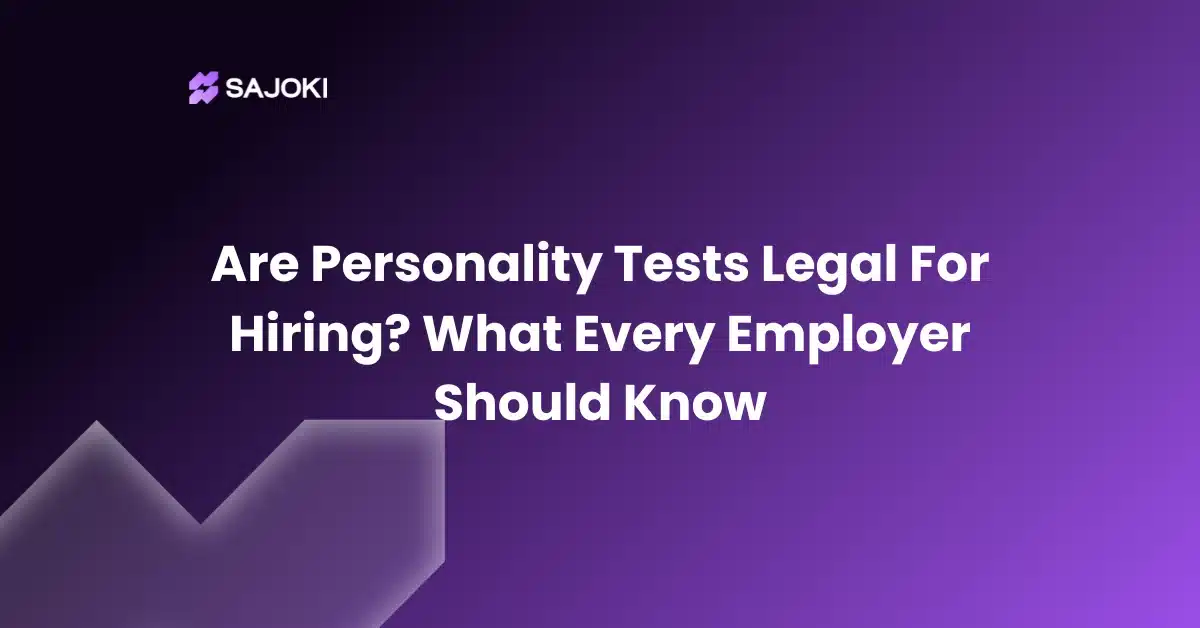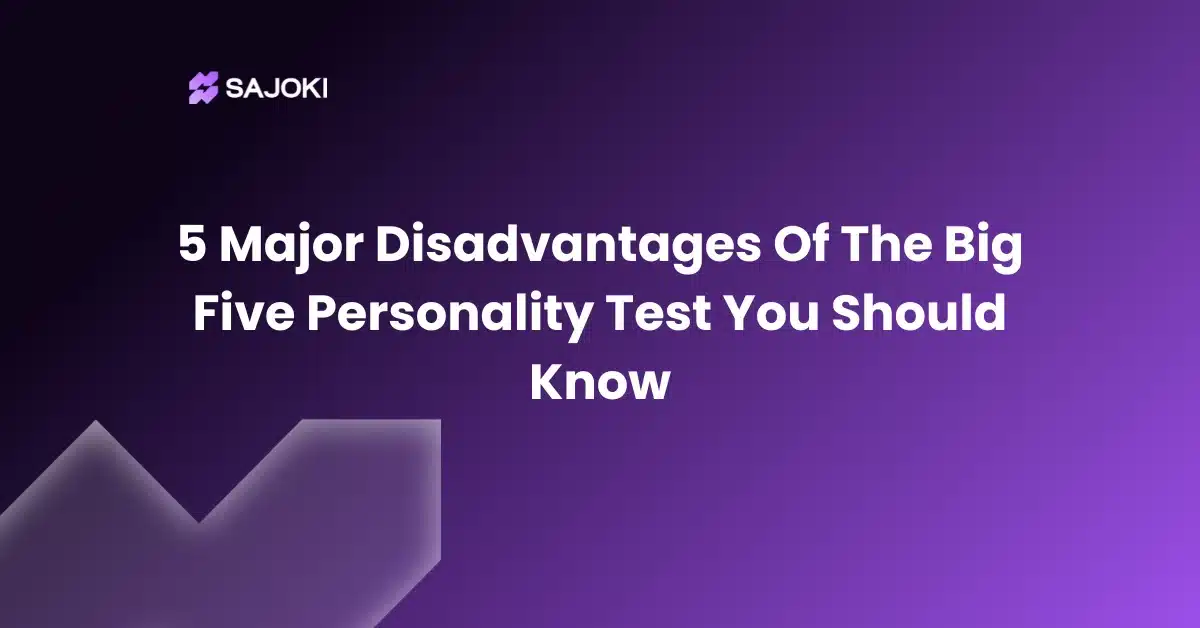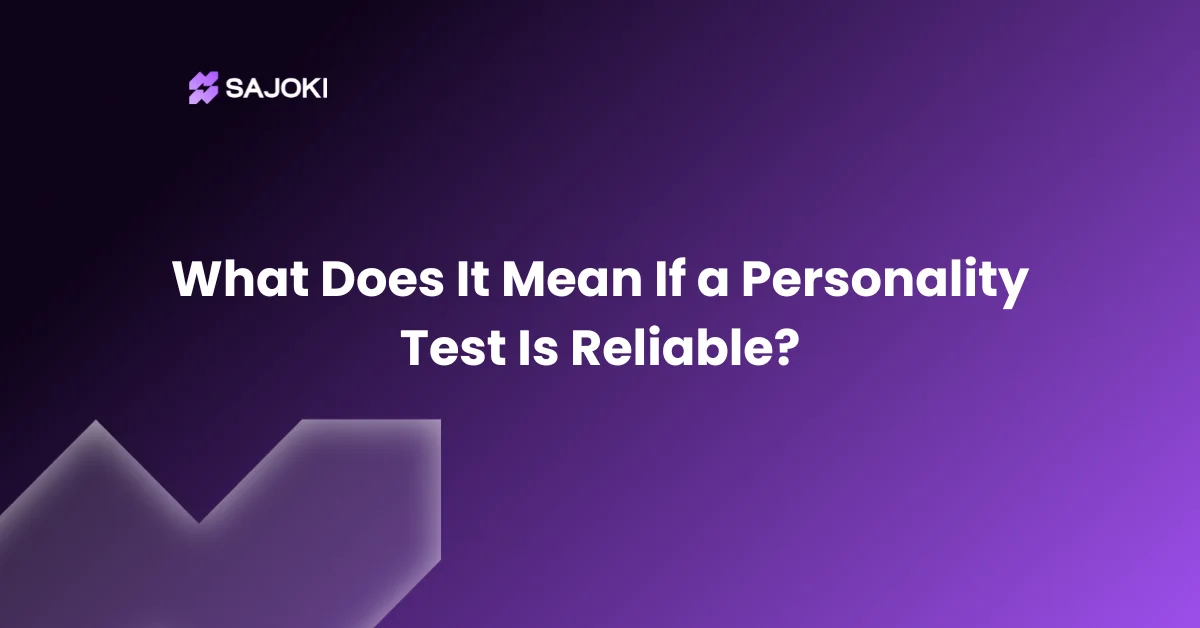The use of personality tests is exponentially growing in companies. Whether it be to uncover job performance or cultural fit, personality tests have become the norm. However, there are legal implications that also need to be considered.
So are personality tests legal for hiring?
Yes, personality tests are legal when used properly. It’s legal as long as the questions are entirely related to their job role and validated to predict performance reliably. Furthermore, the test must be non-discriminate, where age, gender, race, and other factors are not taken into consideration.
In this blog, we will cover all the legal aspects there is to personality tests for hiring. Don’t worry about the technical jargon; we will explain it in simple terms so everyone can understand it. Let’s dive in!
What Are Personality Tests For Hiring?
Before we understand whether personality tests are legal for hiring or not, understanding what personality tests mean is essential.
Ever taken one of those quizzes that asks if you are an introvert or a natural leader? Personality tests for hiring are a bit like that, but with higher stakes.
Imagine personality tests as workplace quizzes to help you better understand their purposes for hiring. It helps one to find personal preferences, traits, and qualities. In short, how you would behave in the workplace is assessed.
These tools let companies investigate qualities like communication style, problem-solving ability, or pressure handling.
Unlike assessments of technical ability like coding, personality exams assess your behavior and performance in the workplace.
However, legally, these quizzes aren’t just casual tests. They are considered formal pre-employment assessments, like background checks or interviews.
Furthermore, it falls under the umbrella of employment screening tools. Thus, the same anti-discrimination and fairness standards as interviews or skills tests are applied to it.
Some popular pre-employment personality tests that are considered under this definition include the Myers-Briggs Type Indicator (MBTI), the Big Five Personality Test, the DISC Assessment, and the Hogan Personality Inventory (HPI).
Are Personality Tests Legal For Hiring: 6 Key Factors Towards Legality
Personality tests are entirely lawful for recruiting as long as you follow the corresponding regulations. These guidelines have been included in laws to guarantee that anti-discrimination laws are fair, relevant, and followed. Let’s investigate the elements they consider necessary for legal validity.
1. Relevance to the Job Role

First and foremost, the test must focus strictly on traits that matter for the job. Imagine hiring a firefighter. Asking how they handle high-pressure situations makes sense. On the other hand, quizzing them on their love for art doesn’t. Thus, any personality test that questions this is considered illegal.
Every question should link directly to skills or behaviors required for success in the role. If a question doesn’t relate to the work, it’s not just irrelevant, it’s directly illegal.
2. Reliability

Next, the test needs proof it actually works. In other words, the personality test must be scientifically validated. Tests like MBTI, The Big Five, and SAJOKI are some great examples of scientifically validated tests.
Personality tests must be validated through research to show they reliably predict job performance. If they don’t show consistent results that are reliable, the test might not be legal to run on your candidates.
3. Discrimination
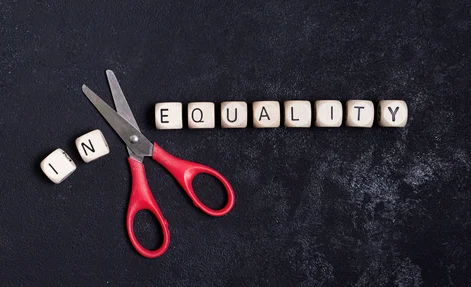
The most important thing out of all the factors is discrimination. If the test discriminates against candidates through age, gender, or race, there will be no second thoughts from the government. It is straight illegal.
On the other hand, there are certain things that you might think are not discriminant, but it is.
For example, if the test asks, “Do you prefer working alone?”, it might unintentionally exclude people with anxiety disorders. As you can see, even small details matter a lot here.
As a result, employers need to make sure that the test doesn’t leave out groups of people unfairly. The court only cares about the outcome, not the intention. Unless it is a must-have required for the job, it will be considered illegal if it screens out certain groups.
4. Transparency

Just like any other thing, transparency is essential before using personality tests on your candidates.
First and foremost, they should know why they are taking the test. This means you have to explain why you are using personality tests on your candidate and why it is important for this role.
Secondly, you need to clarify what the personality test will measure. For example, you have to tell them that it will measure traits like empathy, problem-solving, communication, etc.
Lastly, you need to justify how the results will be used.
For example, how the HR team will use this data to ensure a perfect fit for the role. Overall, secret scoring systems or hidden plans take away trust and invite legal challenges.
5. Data Security

Whether it be your company-developed personality test or outsourced, data security should be the top priority. It’s not a secret that personality tests often collect sensitive information.
Thus, employers must keep the data safe and secure. Furthermore, their data-storing methods should comply with the privacy laws of the General Data Protection Regulation (GDPR) of Europe and the California Consumer Privacy Act of the United States.
6. Medical Information
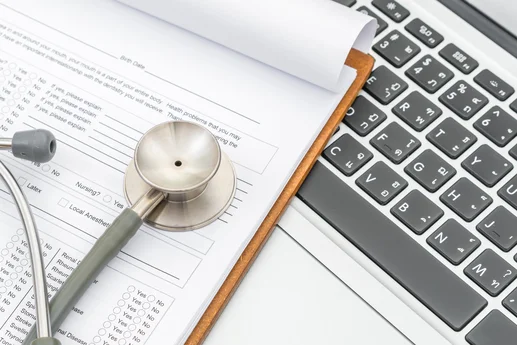
As per the Americans with Disabilities Act (ADA), no personality test should be used to reveal medical or mental health information. This is because the law clearly wants employers to avoid medical biases, meaning hiring someone based on health.
Thus, employers should stick to personality tests that avoid medical records in the process. Furthermore, the ADA also requires employers to provide reasonable accommodations for candidates with disabilities during testing. For example, giving candidates with ADHD extra time for the test.
Existing Content Relevance:
What is the problem with using personality tests for hiring
10 Best Pre-Employment Personality Tests
5 Common Legal Mistakes Employers Make in Personality Tests
Now that you know whether are personality tests legal for hiring, let’s check out some common legal mistakes employers make. This should help you avoid these risks.
1. Asking Questions about Health or Beliefs
Undoubtedly, it’s tempting to dig into a candidate’s personal life. However, questions like “Do you struggle with anxiety?” or “What’s your religious background?” are illegal under laws like the Americans with Disabilities Act (ADA).
These questions risk revealing disabilities, medical conditions, or beliefs that are irrelevant to job performance. Thus, questions that reveal sensitive information that isn’t related to the job should be avoided at all costs.
2. Ignoring Accommodations for Disabilities
Most tests have a set time limit set into it and all candidates must finish it within the set time limit. On the other hand, some tests even have audio/video.
As employers, like everyone, tend to focus mostly on the majority, they often forget about disabilities. Furthermore, providing accommodation for disabilities.
Therefore, every employer should keep the accommodation of disability in mind. The easiest trick would be to ask them directly while stating that it is being asked to provide accommodation for them if necessary.
3. Relying Too Much On Test Results
Hires based solely on personality tests can be a risky move. At the end of the day, it’s just an algorithm, it could potentially discriminate against a certain group. In this scenario, we recommend you pair up interviews and resumes so that your hiring is not solely based on these tests.
Doing this will eliminate even the slightest chance of using these tests in an illegal way.
4. Using The Term Cultural Fit
The term “cultural fit” is really vague and could mean a lot of things when you reject someone for the role. As a result, the candidates often misunderstand it and think the tests are biased.
For example, calling someone “too quiet” might unfairly exclude introverts. This could lead to legal problems. You can handle this smartly by telling them that they lack the ability to be collaborative in team meetings.
5. Mishandling Candidate Data
Mishandling of candidate data is the most common mistake found by employers. While most employers think they are not sensitive data, according to the law, it is.
S,o avoid storing them in places where a breach can be done easily. Furthermore, encrypting the data and then deleting it when no longer needed is one of the best things you could do.
5 Best Practices for Legally Compliant Personality Testing
Let’s face it, personality tests can be a hiring superpower, but only if you use them right. Otherwise, legal problems will be knocking on your door. Here are the best practices to be compliant with the law.
1. Start with a Job Analysis
Before you think of personality tests, take time and figure out what matters to the job role you are hiring for. Try to find out the traits that are required for the role as well as behaviors that lead to success in this role.
Once the manual requirements are set in your head, you now know what’s relevant to the job. Thus, you are able to avoid tests that are irrelevant which will help you stay legal.
2. Pick Tests That Actually Work
While there are tons of options on the market, ensure you select one that is scientifically validated. Personality test providers like SAJOKI, a modern-day pre-employment personality assessment tool, are your best friends as they are backed by science.
These are scientifically validated tests that provide consistent results that are essential to be on the legal side.
3. Keep Testing Fair
The best way to keep testing fair to the next level is by ensuring the same instructions, as well as time (except for disabilities), are received by everyone. Furthermore, ensuring everyone gets the same environment is equally important for a fair test.
If you are wondering why it’s a good practice, uneven testing = bias = lawsuits.
4. Keep Records and Stay Updated
Another great practice you can do is to audit the tests. This is the most essential thing that will come in real handy in the courtroom, as this audit will speak for itself. Furthermore, helps to prove there were no biases in the test.
On the other hand, staying updated with the laws is equally vital. So always be in touch with the lawbooks of GDPR, CCPA, and ADA as they are always shifting, and staying updated is paramount.
5. Train Your Team
The hiring team will often introduce biases in the test if they don’t know how to interpret the results. For example, a bad team member in the hiring team will interpret low extroversion as bad for teamwork.
On the other hand, a well-trained hiring team will be able to spot the red flags in the test. For example, if they see that the test is asking about someone’s beliefs or health, a trained hiring team knows it’s risky in the legal world. As a result, eliminate it instantly.
FAQ
What legal penalties could my company face for non-compliant personality tests?
Fines can be steep! Violating the U.S. laws can cost up to $300,000+ per lawsuit, while GDPR (Europe) fines can hit €20 million or 4% of global revenue.
Can candidates request to see their personality test results?
Yes, candidates can request to see their test results. Thanks to laws like GDPR (Europe) and CCPA (California), candidates can request their data.
How often should we review our personality testing process for legal compliance?
You should review it once every year to be on the safe side. Laws are always changing; thus staying updated is vital.
Conclusion
Overall, the answer to whether are personality tests legal for hiring or not is yes, they are legal if used correctly. Use tests that measure job skills, not personal beliefs or health as a whole. Furthermore, the tests need to be unbiased, and scientifically validated that provide consistent results.
On the other hand, being proactive about legal compliance is key to success. Personality tests are superpowers that you can’t afford not to use. Our best suggestion would be to select the right tool, keep audits of the personality tests, and lastly, train your hiring team well.
